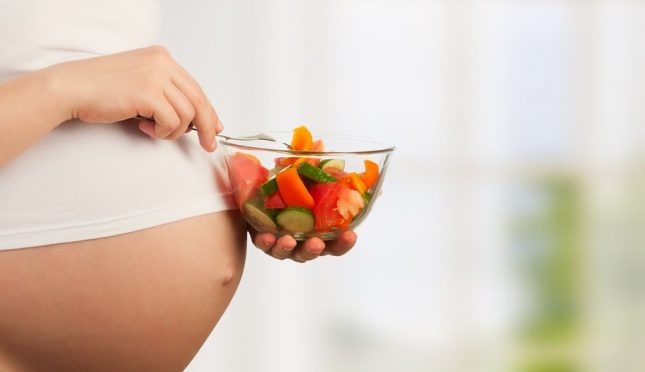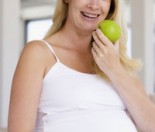For many women, preconception nutrition is not considered unless they have a related health issue or are consciously planning for a healthy pregnancy. Once pregnant, focus tends to be on planning arrival of baby, so post-conception nutrition can be an afterthought, yet remains vitally important throughout pregnancy.
General Dietary Advice for a Healthy Pregnancy
Additional energy is needed for women in pregnancy and lactation to care for the all-important needs of their growing baby, womb and placenta, and later for the production of breast milk for feeding. So first ensure adequate fluid intake – blood volume increases by about 30% over the pregnancy and mum’s body has to cart out the waste of not only her increased metabolism, but that of the developing baby as well.
Dietary adjustments are highly relevant in the preconception stage. Specific nutritional choices can be beneficial for women contemplating pregnancy. Replacing animal protein with vegetables proteins for example has been shown to be beneficial in some women in preconception. Low-fat dairy products have been connected with higher rates of infertility, as have high dietary intakes of trans-unsaturated fats.
Eating organic produce as much as possible is a sound option to reduce any potential exposure to environmental chemicals and pesticides. The risk of Listeria (and subsequent harm to the developing foetus) requires reduction or elimination of delicatessen-type foods. This is outlined in the Ministry of Health’s “Food Safety in Pregnancy” booklet, downloadable for free. (You can also read more about food safety and nutrition here.)
A healthy balanced diet that contains high levels of nutrients is paramount to the health of mother and baby. That includes a variety of brightly coloured fruits and vegetables to provide optimum levels of antioxidants, quality sources of protein such as meat (organic where possible) if consumed, cheese, eggs, tofu or tempeh and legumes if the mother is vegetarian or vegan. Ensuring adequate levels of protein is particularly important consideration for vegans.
In fact, a study conducted by The Danish Research Foundation found that preconception vitamin profiles were linked to better pregnancy outcomes. Issues such as the development of pre-term labour, premature rupture of membranes, and medical induction, were all impacted by adequate preconception vitamins, minerals and essential fatty acids.
Dr A A Sayer of the University of Southampton reports on the importance of early commencement of a preconception diet, its impact on critical periods of growth and development of infants, and how under-nutrition of the mother can permanently alter the structure and function of different body systems. These factors can have crucial long-term influences on a child’s health.
Nutrition Guidelines for a Healthy Pregnancy – Vitamins and minerals
Vitamins, minerals and food groups most likely to be at risk of deficiency are:
Vitamin B12. This important vitamin is found in eggs, milk, cheese, lamb, beef, chicken, fish, canned salmon and sardines. While small amounts are found in yeast products, tofu and fermented foods like tempeh these would not be expected to supply adequate amounts of Vitamin B12 during pregnancy and so a supplement is recommended for vegans and some vegetarians. Vitamin B12 deficiency causes anaemia and nervous system dysfunction.
Vitamin D. The best source of this very important nutrient is sensible sunshine exposure. It is also obtained from the fatty parts of animal foods – such as cod liver oil, eggs, canned fish as well as from some fortified foods. Research reveals more and more associations with vitamin D deficiency in the areas such as immune function, brain development, cancer prevention as well as the important role in calcium absorption.
Calcium. As well as dairy products, great sources of calcium are sesame seeds, soya beans, almonds, kale, collards and other leafy greens like spinach or silverbeet, rhubarb, broccoli. Canned salmon and sardines (with soft-edible bones) are also very high in balanced calcium. Calcium is needed to lay down the foundations for strong bones and teeth – a dietary deficiency will contribute to bone loss in the mother (and subsequent osteoporosis later in life).
Folic acid. Most women are routinely prescribed this as soon as they are pregnant, however as part of good pre-conception care, we advise ensuring good levels of folate prior to becoming pregnant. Best dietary sources are “foliage foods” – and dark green vegetables – broccoli, spinach, silver-beet, dark cabbage leaves, dark lettuce, kale. Folate is also found in some yeast products, whole grains, avocado, asparagus, banana, barley, chickpeas, spirulina, oranges, eggs and most nuts, including peanuts. Folic acid deficiency causes anaemia and is associated with congential malformations of the spinal cord, such as Spina bifida.
Iron is easily obtained from dark meats. Non-haem sources of iron include pumpkin seeds, oily fish, seeds, sweet potato, leafy greens like spinach and parsley, eggs, nuts, legumes, sea vegetables. Note that non-haem iron is not as well absorbed so the consumption of vitamin C or vitamin C-containing foods at the same meal improves absorption. Iron deficiency causes anaemia.
Iodine. This micronutrient is deficient in New Zealand soils, but found in ocean fish and seafood, seaweed, brassicas, peanuts, soya beans, Celtic sea salt, Himalayan salts and iodised table salt. Deficiency during pregnancy can cause cretinism.
Protein: from – animal foods, fish & seafood, soya beans (soy milk tofu, tempeh), quinoa, nuts and seeds, legumes and pulses, leafy greens. Protein is important for the normal development of the foetus and for mum to remain healthy.
Carbohydrates: While carbohydrate deficiency is extremely rare, the consumption of refined carbohydrates (sugars, white flour products, white rice etc) can lead to excessive weight gain during pregnancy which increases the risk of the development of gestational (pregnancy) diabetes and an overweight baby. Wholegrain/wholemeal sources of quality carbohydrates are better options to moderate rises in blood sugar level and are better sources of vitamins, minerals and essential fatty acids, all of which are required for healthy conception.
Prior to conception it is useful to ascertain the status of the following nutrients in both parents – B12, Vitamin D, calcium, Folic acid, iron, essential fatty acids and protein levels. Some of these can be ascertained by routine blood tests and others are best assessed by a nutritional consultant who can advise re adjusting the daily diet where deficiencies (or excesses) are identified.
Keeping a 3 – 7 day food diary is a good place to start for evaluation – take it with you to your nutritional consultation. This can be repeated where necessary throughout pregnancy as well as during breastfeeding to pinpoint and fine-tune mum’s diet.
Body weight can play a significant role in preconception. Overweight or obese women are less likely to conceive than women of normal body mass. Just as women who are underweight may also have trouble conceiving. Hormone and ovulatory dysfunction are also negatively impacted by being obese or underweight. Quality nutrition, lifestyle and exercise modification can all have a significant benefit for conception outcomes in relation to body weight.
Factors to Avoid for a Healthy Pregnancy
Mercury is a known neurotoxin and accumulates in fish. Due to the potential for harm to the developing nervous system of the foetus, pregnant women are advised to restrict the consumption of NZ trout, shark, marlin and bluefin tuna to a maximum of one serve every 1-2 weeks because of the high mercury levels they contain. Certain other fish species should also be restricted – read the MOH document here. In addition, Bluff oysters and queen scallops have a high cadmium concentration which is also toxic to the developing foetus (see the Ministry of Health’s Pregnancy booklet). We recommend you minimise your intake of these species (regardless of how they are prepared) both before and during pregnancy.
Alcohol and cigarette smoking and excessive intake of caffeine may all adversely affect fertility as well as risk detrimental effects on both the developing foetus and the long-term health of the mother.
Stress in its many shapes and forms may affect not only conception but also pregnancy outcomes. Immune dysfunction and chronic inflammation – both of which can go undetected for long periods of time – are other contributors to compromised fertility and wellbeing during pregnancy and should also be considered in preconception planning.
Summary
In addition to maintaining a healthy body weight and keeping fit, conception outcome is advantaged by eating a nutritious, balanced diet that emphasises fresh fruit and vegetables, adequate protein, good quality water and micro-nutrients as well as avoiding sources of potentially harmful toxins.
Once pregnant, continuing along this line with a high level of vigilance and will see both mother and baby growing healthily and happily.
For more expert advice on pre and post-pregnancy health, check out our Pregnancy and birth section.






